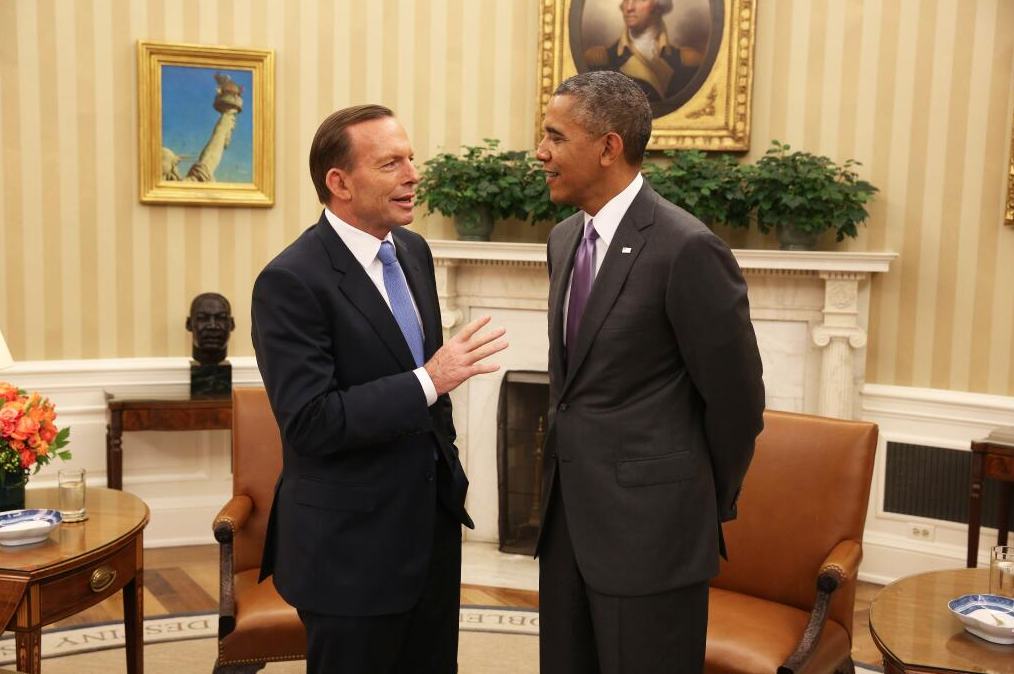The pulse in Washington: Australia’s tools in supporting the pivot
Posted By Hayley Channer on June 17, 2014 @ 14:30
 [1]Over the last three months in Washington I’ve asked Pentagon and State Department officials and think tank analysts to rate Australia’s contribution to regional security and articulate what more Canberra could do to support the US rebalance to Asia. The overwhelming message is that Australia should have a stronger political voice in regional matters.
[1]Over the last three months in Washington I’ve asked Pentagon and State Department officials and think tank analysts to rate Australia’s contribution to regional security and articulate what more Canberra could do to support the US rebalance to Asia. The overwhelming message is that Australia should have a stronger political voice in regional matters.
Many in Washington think that the biggest contribution Australia could make is to encourage a rules-based order and adherence to international norms. Specifically, Australia could step up its efforts to encourage the establishment of Codes of Conduct (COC) in the maritime domain and, in particular, in the South China Sea. Australia could be more of an asset to the US by being one of potentially many voices in Asia encouraging China to act responsibly in maritime disputes and accept the continuation of the US hub-and-spoke system of alliances.
While several Washington analysts commended Australia’s rebuke of China’s Air Defence Identification Zone (ADIZ) [2], a number were critical of Canberra’s failure to speak out more strongly on the South China Sea dispute. One analyst said that Australia should go as far as declaring that ‘China’s nine-dash line has no standing in international law’. This’d be a major departure from Australia’s current position of neutrality, but there are opportunities for Australia to take a more active stance.
It’s not in Australia’s interest to take a position on China’s nine-dash line, but it’s in our interest to establish a rules-based order. Australia has made some lukewarm statements to this effect [3] but it could strengthen its position by denouncing hostile acts in the disputed area, welcoming the Philippines’ move to international arbitration and encouraging claimants to adopt a multilateral response to China so that Beijing can’t continue its salami slicing tactics. The US, Japan [4] and Vietnam [5] have voiced support for the Philippines’ move and Malaysia recently said [6] it supports settling competing territorial claims through international mechanisms.
Given these calls for Australia to take a more involved diplomatic role in the South China Sea dispute, I had to ask, how much did Washington experts really think Australia could influence Chinese assertiveness in territorial claims or change the strategic balance in the region? Many felt Australia’s voice could join others’ in the region in calling for a rules-based order and a multilateral approach to managing disputes.
Some suggested that Australia could exercise indirect influence over China through our bilateral relationships with Japan and India. In my view, Australia’s close defence partnership and common values with Japan undoubtedly play a role in China’s strategic calculus, but Australia is a long way from wielding indirect influence over China through its bilateral relationship with India, which is likely to remain limited [7] in the short to medium term.
As well as having a stronger political voice, DC-based think tankers said Australia could assist the US by disagreeing with Washington on certain low-level regional or global issues. In expressing an opposing view and demonstrating a level of independence and objectivity—‘calling the US out’ on certain issues—we contribute to the promotion of a rules-based order.
In terms of Australia’s military support for the rebalance, opinion among those I spoke to was split over whether Australia is pulling its weight. There’s significant appreciation for Australia’s involvement in US-led military campaigns and respect for its existing defence capability (a feeling bolstered by our recent acquisition program). Though Americans thought Australia could do more by upgrading its ground and air force bases to host more US troops and aircraft; provide the US Navy with enhanced access to Australian ports; increase its maritime domain surveillance and anti-submarine warfare capabilities; and invest in high-grade cyber and information warfare capabilities for defensive and offensive purposes. In addition, Australia could increase its interoperability with the US and its allies to further integrate itself into the alliance system. However, the role of Australia’s political voice in supporting the rebalance was on the tip of almost every Washington tongue, suggesting that Australia’s efforts on the defence side have been noted but it’s now time to focus on stronger political messaging and consensus building.
Those familiar with Australian domestic politics had some sympathy for the obstacles faced in attempting to bolster our defence capabilities and support US policies. Washington analysts cited a lack of Australian public support for a broader defence agenda and the debate about whether Canberra should get closer to Washington or adopt a more independent foreign policy and show deference to China. This debate [8] perplexes many in the US who can’t understand why this issue continues to gain currency.
Overall, the message was ‘yes, Australia is a staunch and reliable ally’, but in terms of our contribution to the rebalance, the feeling is mixed. Australia has a dotted scorecard. Our closest strategic partner and security guarantor would like to see the maturation of Australian foreign policy and of domestic political debate, whereby we’d become more vocal and proactive on regional matters and conclude the US–China debate in favour of reinforcing the US alliance.
Hayley Channer is an analyst at ASPI. She is currently a visiting scholar at the East-West Center, Washington DC. Image courtesy of Twitter user TonyAbbottMHR [9].
Article printed from The Strategist: https://www.aspistrategist.org.au
URL to article: https://www.aspistrategist.org.au/the-pulse-in-washington-australias-tools-in-supporting-the-pivot/
URLs in this post:
[1] Image: http://www.aspistrategist.org.au/wp-content/uploads/2014/06/abbott-obama.png
[2] Australia’s rebuke of China’s Air Defence Identification Zone (ADIZ): http://www.foreignminister.gov.au/releases/Pages/2013/jb_mr_131126a.aspx?ministerid=4
[3] made some lukewarm statements to this effect: http://www.dfat.gov.au/media/releases/department/2014/dfat-release-20140514.html
[4] Japan: http://japandailypress.com/japan-voices-support-as-philippines-stake-claim-on-territory-vs-china-0246731/
[5] Vietnam: http://www.manilatimes.net/vietnam-backs-arbitration-of-sea-dispute-with-china/25151/
[6] Malaysia recently said: http://www2.nst.com.my/latest/font-color-red-obama-in-kl-font-obama-visit-elevates-us-malaysia-partnership-1.581263
[7] is likely to remain limited: http://carnegieendowment.org/2014/03/18/india-australia-strategic-relationship-defining-realistic-expectations/h4k3
[8] debate: http://www.smh.com.au/comment/australia-would-ditch-the-us-as-an-ally-at-its-peril-20140610-zs2pn.html
[9] TonyAbbottMHR: https://twitter.com/TonyAbbottMHR/status/477149654467870721
Click here to print.